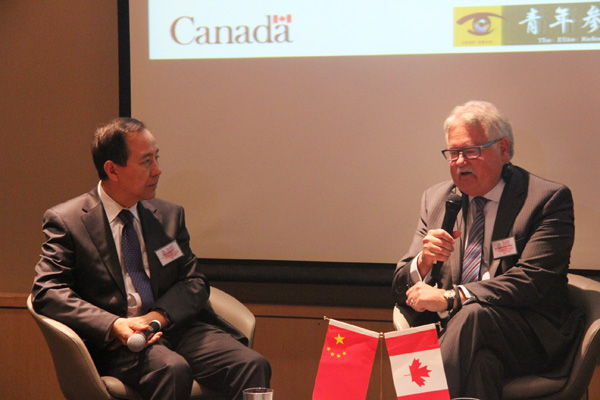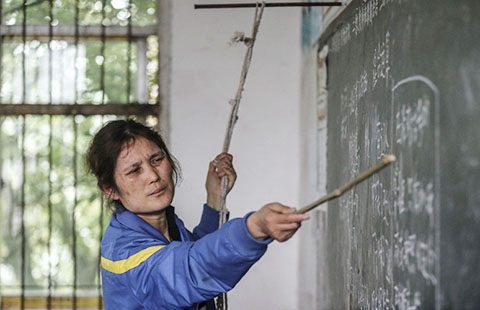Alliance on public health to expand
Updated: 2015-04-02 05:46
By Wang Ru in Beijing(China Daily Canada)
|
||||||||
 |
|
Wang Yu, director of the Chinese Center for Disease Control and Prevention, engaged in conversation on Tuesday with Dr. David Bulter Jones in Beijing. Wang Ru/China Daily |
China, Canada pledge to bolster fight against diseases, pandemics
China and Canada pledged to strengthen their longstanding collaboration in public health, a two-decades old alliance that officials say has widely benefited the two countries.
With regular dialogue conducted between various levels of government, research labs and NGOs, the two countries continue to actively work together on chronic diseases, pandemic control, public health policymaking and management.
On Tuesday, the Canadian Embassy in Beijing invited public health experts from Canada and China to attend a seminar titled 20 years of Canada-China Health Cooperation: Lessons learned and future prospects.
"China and Canada are separated by the Pacific Ocean, but both countries have experienced how the outbreak of pandemics can affect on a global-scale," said Wang Yu, director of Chinese Center for Disease Control and Prevention.
"During the 2009 H1N1 pandemic influenza, Canada was one of the worst-affected countries besides Southeast Asian countries, including China," said Wang, "We must cooperate and share information by realizing that no country could assure that its population could be immune from the next pandemic influenza."
On January 26, 2015, the first human infection of avian influenza (H7N9) in Canada was reported. A second case was later confirmed. The two men confirmed infected had traveled from Hong Kong to Canada after they had traveled together on the Chinese mainland.
Dr. David Butler Jones, Canada's first chief public health officer of the Public Health Agency of Canada, attended the seminar and stressed the cooperation between Canada and China would benefit both countries.
Following the SARS outbreak, the Canadian government created the Public Health Agency of Canada in 2004 to provide leadership and action on public health matters.
"We are consistently learning experiences from our different ways and understanding to certain public health issues and gaining interactive benefits on disease control and chronic disease," said Jones, who served as public health officer from 2004 to 2014.
He introduced that researchers from Waterloo University in Canada are collaborating with Chinese experts in smoking-control.
"This is a good example for the importance to exchanging information from each other. As you know, smoking-control is not only a health issue but also culturally different in Canada and China," said Jones.
In 1995, China and Canada signed a memorandum of understanding to jointly act in the public health collaboration. The two countries have formed a minister-level dialogue mechanism on emergency pandemic and epidemic diseases.
A biennial dialogue on chronic disease monitoring and risk control is held between the two countries’ experts. Discussions on topics including family physicians and telemedicine were held in the past two years.
During the Beijing Olympic Games in 2008, Canada sent an emergency team of pandemic experts to help China prevent latent outbreaks of known or unknown diseases.
China has made great progress on public health and disease control and prevention since the 2003 SARS outbreak and started to join the global cooperation.
"With experiences learning from cooperation with countries such as Canada, China now has ability to join international cooperation to fight against pandemics," said Wang.
After the Ebola outbreaks in West Africa, China dispatched a medical team to help the worst hit countries such as Sierra Leone and Liberia.
"Our medical team has provided medical and humanitarian help to the countries and trained over 13,000 local people ranging from villagers to medical workers to prevent and protect themselves from Ebola. The mission will continue," said Wang.
"We expect closer cooperation with public health professionals from Canada, especially the innovation sectors on vaccines and medicine research and development," said Wang.
Known as VSV-EBOV, one of the two most effective vaccines against Ebola was developed by researchers in Canada’s National Microbiology Laboratory in Winnipeg.
Wang said China has also developed advanced experiences on public health that interests his Canadian counterparts.
"For example we have established a functioning national-level monitoring system on public health emergency," said Wang.

 Off the beaten path: China's top 'surf' breaks
Off the beaten path: China's top 'surf' breaks
 Across America over the week (from March 27 to April 2)
Across America over the week (from March 27 to April 2)
 Where eagles still soar
Where eagles still soar
 Top 5 cooperation priorities in the Belt and Road Initiative
Top 5 cooperation priorities in the Belt and Road Initiative
 10 destinations for a Qingming outing
10 destinations for a Qingming outing
 'Silk Road' captured in planted field
'Silk Road' captured in planted field
 Teaching on a rope
Teaching on a rope
 Bambi artist, 104, has show in NYC
Bambi artist, 104, has show in NYC
Most Viewed
Editor's Picks

|

|

|

|

|

|
Today's Top News
China checkmates US on Asia bank
Policy helps China to urbanize
Curbing 'brushing' difficult: report
Conflict not inevitable: Joseph Nye
Obama: Iran framework could make world safer
Democratic senator pleads not guilty to corruption
China still No 1 for US adoptions
Mainland objects after US fighter jets land in Taiwan
US Weekly

|

|






